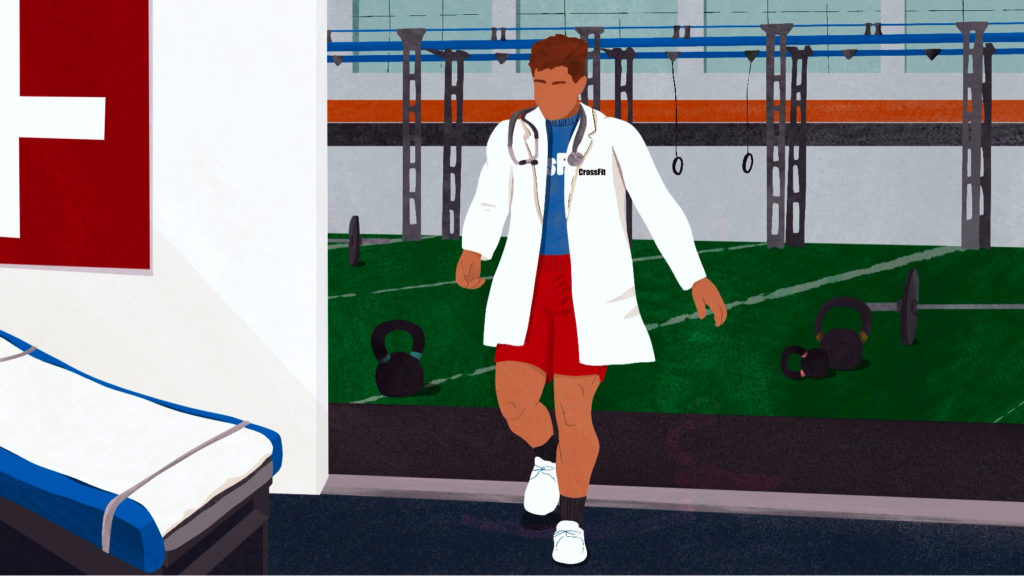Last week, CrossFit unveiled its plan to disrupt healthcare.
The healthcare system is broken, CrossFit CEO Eric Roza said. And his company is the “logical party” to fix it.
A bold statement, no doubt, but is it a realistic one? Let’s take a look.
Get Caught Up
In 2020, CrossFit was in full-blown crisis mode.
Sponsors, affiliated gyms, and athletes disavowed the brand when its founder and former CEO Greg Glassman tweeted inflammatory remarks about the death of George Floyd. Additional revelations of misconduct under Glassman’s reign forced a firesale.
Taking over, Eric Roza, a bonafide CrossFitter (athlete, coach, and affiliate owner) and former tech executive, purchased the company for $200M last summer.
When the acquisition was announced, we asked: Can CrossFit Be Saved?
TL;DR: A massive undertaking, orchestrating a successful turnaround would legitimize one of the world’s largest fitness brands.
“Growth Vectors”
Nearly a year later, in July, we hosted Roza on the Fitt Insider Podcast.
Discussing progress thus far and his vision going forward, Roza laid out six “growth vectors” for the future of CrossFit.
The first three were existing businesses: gym affiliates, instructor training, and The CrossFit Games. Next, prioritizing emerging opportunities in the direct-to-consumer realm, Roza pointed to:
- digital content for exercisers and affiliates
- ecommerce capabilities and merchandise
- CrossFit Health and healthcare initiatives
Pressed for details on CrossFit Health, Roza said a new offering was close to market, adding:
“[We’re] working with top doctors and healthcare practitioners who believe there’s a better way to keep people healthy than the current healthcare system provides… and they believe CrossFit is a core part of it.”
Fitness x Healthcare
CrossFit’s healthcare ambitions aren’t new.
Before his ouster, Glassman championed CrossFit Health, describing it as “an elegant solution to the world’s most vexing problem.”
In theory, CrossFit would work with doctors, prescribing its workout regimen and lifestyle modifications to combat chronic illness. But, as Outside put it, the plan lacked a clear objective and never fully materialized… until now.
The news: Last week, CrossFit Precision Care debuted, marking the company’s official re-entrance into the healthcare arena.
What it is: Described as “primary care for CrossFitters, by CrossFitters,” Roza said the service is “fitness meeting healthcare for the first time.”
How it works: Part personalized care, part health optimization, the offering includes:
- Genomic testing
- Blood testing
- Longevity analysis
- Lifestyle review
Additionally, members are paired with a CrossFitting doctor and support coach for remote/ongoing access.
CrossFitMD. During the pandemic, telehealth use soared 38x — which could shift more than $250B in US healthcare spending to virtual visits. Elsewhere, the popularity of wearables, at-home diagnostics, and concierge medicine bolstered the notion of high-performance health.
While pay-as-you-go primary care options like Parsley Health and Forward respectively tap functional medicine and advanced tech, CrossFit envisions a similar service built around high-intensity workouts and health optimization.
Of note, the concept isn’t dissimilar from SteadyMD, a telehealth provider popular with CrossFitters. With more than $35M in funding, the company previously partnered with successful CrossFit athlete Dr. Julie Foucher. Now, Foucher is co-founder of CrossFit Precision Care.
Looking Ahead
In CrossFit circles, members who swear by the workout regimen will line up for Precision Care. Meanwhile, onlookers will likely poke fun, questioning the cultish brand’s far-flung plan to disrupt healthcare.
Will it work? Who knows. But a fitness company wading into healthcare is noteworthy nonetheless. A departure from unused gym memberships, celebrity instructors, and high-priced home equipment, a focus on meaningful health outcomes could transform the fitness industry.
🏆 Perform Better
From pro athletes and weekend warriors to everyday exercisers, preparing for and recovering from a competition or workout has spawned a billion-dollar industry.
On the Fitt Insider Podcast: Therabody CEO Benjamin Nazarian joined us to discuss the company’s evolution from a single product—the Theragun–into a platform for pain management.
We also cover: Therabody’s approach to athlete and celebrity partnerships. Plus, we get a look at emerging and adjacent verticals, including breathwork, contrast therapy, and mental fitness.
Listen to today’s episode here.
🌎 Around the World
The global competition for the trillion-dollar fitness consumer is heating up.
lululemon-owned MIRROR will debut in Canada next month. The Vancouver-based apparel brand will begin selling its home workout device at 40 Canadian locations starting in late November.
After entering Australia this summer, Peloton gets its “big bang” moment Down Under this week as its showrooms begin opening across the country. Delayed by the pandemic, the connected fitness company will add additional stores throughout the holiday season and into next year.
Eyeing expansion in mainland China, Hong Kong gym chain Pure Group, owner of the Pure Yoga and Pure Fitness brands, is seeking to raise about $100M in funding. According to Bloomberg, a deal could value the gym chain at more than $400M.
Zooming out: This news adds to developments we’ve been tracking. From VAHA and Curefit-owned TREAD to Fiture, the Peloton of ‘X’ trend has gone global.
Plus, as we noted in Issue No. 150, Brazilian gym chain SmartFit recently completed its public offering. Meanwhile, in the UK, brick-and-mortar operators The Gym Group and PureGym are seeing visits rebound.
Stateside: Last week saw health club operator Life Fitness make its public market debut in a downsized IPO. Pressing pause, equipment maker iFIT Health & Fitness delayed its public offering, citing unfavorable market conditions.
👀 Startups to Watch
Over the weekend, on LinkedIn, I asked: “What’s an under-the-radar health & fitness startup?”
So far, about 200 people have replied, tagging up-and-coming companies. If you’re a founder, investor, or just curious about what’s next in fitness and wellness, you should check out the post.
Keep the thread going! Tag a company to know in the comments. And if you’re launching or raising money for your startup, reach out here — we invest in early-stage health, fitness, and wellness companies.
📱 No Hardware, No Problem
Connected fitness flourished during the pandemic, but digital-only workouts are scaling up.
Virtual fitness and wellness app FitOn raised $18M in Series B funding led by Delta-v Capital. Founded in 2018 by ex-Fitbit VP Lindsay Cook and her husband, AllTrails founder Russell Cook, FitOn has amassed 10M users over its history.
The app’s “freemium” model offers a library of no-equipment workouts ranging from yoga and barre to dance, cardio, and strength, where videos are ad-supported.
Lending to its popularity, FitOn has found success in leveraging partnerships with the programs of well-known trainers and celebrities, including Cassey Ho’s Blogilates, Halle Berry’s rē•spin, and Julianne Hough’s KINRGY.
Equipment agnostic. Elsewhere, equipment-free digital platforms have attracted both the fitness industry’s top free-agent trainers and the attention of investors.
- AI-driven app Freeletics raised $25M in fall 2020.
- obé fitness secured $15M in a Series A this summer.
- iFIT Health & Fitness acquired SWEAT for $300M this July
Big tech. Not to be outdone, Apple Fitness+ and Amazon Halo Fitness rely on wearables + content, not connected equipment, to deliver digital workouts.
Looking ahead: FitOn is well-positioned to grow its market share in the US and beyond, but as the pandemic continues to reshape and accelerate the at-home landscape, digital-only solutions will battle increased churn and rising acquisition costs as competition intensifies.
📰 News & Notes
- Withings gets FDA approval for its health-sensing ScanWatch.
- Assistive tech aims to increase access and destigmatize disabilities.
- WW International (Weight Watchers) CEO Mindy Grossman steps down.
- Best Buy to acquire Current Health, a care-at-home technology platform.
- Fitt Jobs: Check out 1,000+ openings at leading health and fitness companies.
- Startup Q&A: Volt Athletics co-founder and CEO Dan Giuliani on AI-powered fitness.
💰 Money Moves
- FitOn, a digital fitness and wellness app, raised $18M in Series B funding led by Delta-v Capital.
- GraphWear, makers of a noninvasive, wrist-worn continuous glucose monitor, raised $20.5M in Series B funding led by Mayfield.
More from Fitt Insider: The Business of Glucose Monitoring - Twin Health, a digital platform using AI and machine learning to combat diabetes, landed $140M in a Series C round from Sequoia Capital India, ICONIQ Growth, and others.
More from Fitt Insider: Combating Obesity - Slinger, a connected sports company, will acquire PlaySight Interactive, a video capture and analysis firm.
More from Fitt Insider: Growth in Sports Tech - Oshi Health, a virtual care company focused on gastrointestinal (GI) health, raised $23M in Series A funding.
More from Fitt Insider: Gut Check - Mental wellness app MindLabs added $3.5M in a seed round led by PROfounders Capital.
- Bisu, a personalized nutrition platform utilizing at-home urine and saliva testing kits, raised $3.2M in seed funding from QUAD, with participation from ASICS, Pacifico Ventures, and others.
- Health tech platform KinoTek, makers of movement health analysis software, closed a $2.1M seed round.
- BetterBrand, creators of a reduced-carbohydrate bagel, added $2.5M in a funding round led by Seven Seven Six.
- Atlantic Food Labs, a food tech-focused venture studio, rebranded as FoodLabs after closing €100M ($115.5M) to fund early-stage food, health, and sustainability startups.
- Mindful Care, an urgent care clinic for mental health, closed an oversubscribed, $2.7M Series A round led by Sopris Capital, with participation from University of Chicago and others.






